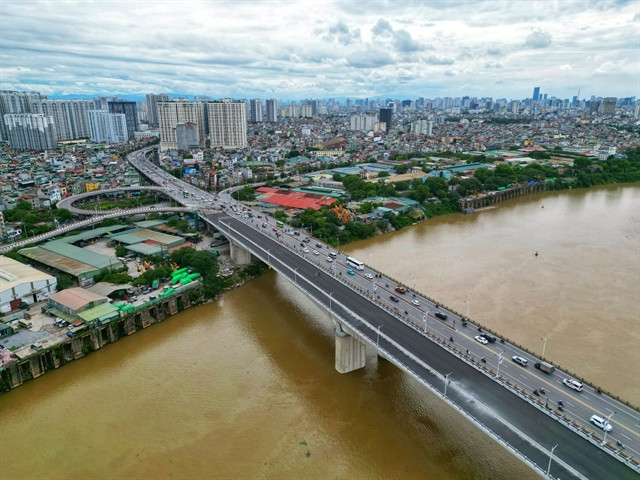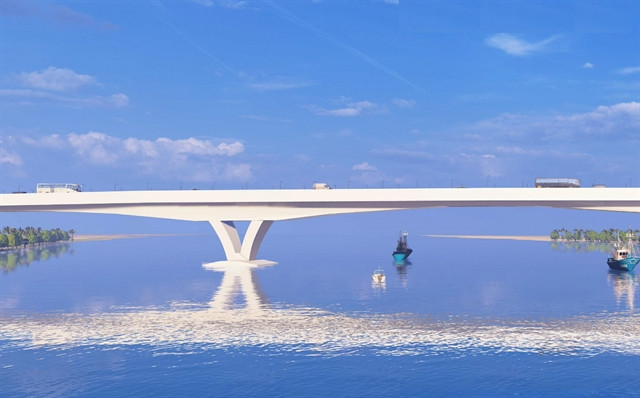 |
|
Vĩnh Tuy 2 Bridge that was opened to traffic on August 30, 2023. |
The municipal authorities of Hà Nội will carry out bridge construction projects in the coming years to realise urban development plans along both sides of the Red (Hồng) River and in the provinces and cities in the Capital Region.
The five bridges that Hà Nội has identified as investment priorities include Hồng Hà, Mễ Sở, Thượng Cát, Vân Phúc and Tứ Liên.
These bridges will play an important role in the city’s transport infrastructure system connecting many urban areas with ring roads.
 |
|
Artists' render of Mễ Sở Bridge. — Photo from Hà Nội People's Committee |
Particularly, the two bridges of Hồng Hà and Mễ Sở are located on Ring Road 4, an important route for the development of the Capital Region.
Hồng Hà Bridge will be built about 11.5km upstream from the current Thăng Long Bridge, its expected location at Km43+000 (Hữu Hồng Dyke route) in Hồng Hà Commune of Đan Phượng District.
Once completed, Hồng Hà Bridge will contribute to reducing the density of vehicles passing through Thăng Long Bridge, shortening connection time and enhancing trade between western Hà Nội and adjacent provinces.
Mễ Sở Bridge is also located on Ring Road 4, spanning the Red River.
The bridge will cross Hữu Hồng Dyke in Thường Tín District and cross the Red River at Km57+900, and then cross Tả Hồng Dyke in Văn Giang District of Hưng Yên Province.
Mễ Sở Bridge is a link between Pháp Vân- Cầu Giẽ Expressway and Hà Nội - Hải Phòng Expressway, contributing to reducing vehicle traffic entering Hà Nội inner city area as well as increasing the operational efficiency of both expressways and reducing travel time between Hà Nội and Hưng Yên District.
According to head of the Financial Planning Division (Hà Nội Department of Transport) Phan Trường Thành, Hồng Hà and Mễ Sở bridges are located on Ring Road 4, so they will quickly be invested in and built along with the overall progress of the "great project" of the Capital Region.
The alignment, planning and location of both bridges have been approved by the Prime Minister.
At the meeting at the end of October 2022, leaders of Hà Nội, Hưng Yên and Bắc Ninh provinces agreed on design plan, scale and scope of site clearance for these two bridges, Thành said.
At present, districts in the southwest region of the city such as Phúc Thọ, Thạch Thất, Quốc Oai, Chương Mỹ and Ứng Hoà have a fast pace of urbanisation and industrialisation.
However, the transportation system in the region mainly relies on a number of provincial and district roads built in the 70s-80s last century. Traffic connections across the Red River are mainly on Thăng Long Bridge to Nội Bài-Lào Cai Highway and Vĩnh Thịnh Bridge to National Highway 2C.
Under the Capital Transport Planning and the Transport Development Plan of Vĩnh Phúc Province approved by the Prime Minister, Vân Phúc Bridge in Vân Phúc Commune of Phúc Thọ District will be built over the Red River connecting the North - South route with Ring Road 5 in Vĩnh Phúc Province.
Vân Phúc Bridge will contribute to improving the regional transportation system by opening an additional transportation route across the Red River to connect Vĩnh Phúc Province with Hà Nội.
It is expected that Vân Phúc Bridge will have its starting point at the intersection with National Highway 32, in Phụng Thượng Commune in Phúc Thọ District, and the end point in Yên Lạc District of Vĩnh Phúc Province, linking the traffic route of the left dyke of the Red River to Vân Phúc Bridge invested by Vĩnh Phúc Province.
Meanwhile, Thượng Cát Bridge located on Ring Road 3.5 will open a new development direction for the northwest gateway of Hà Nội.
Thượng Cát Bridge and Ring Road 3.5 will contribute to reducing traffic volume for Ring Road 3 and create a "core axis" for urban development in the west of Hà Nội, as well as ensure transportation infrastructure conditions to serve the chain of industrial parks and urban areas along the route in the future.
Thượng Cát Bridge has a starting point connecting with the Ring Road 3.5 Project and end point at the intersection with North Thăng Long Industrial Park in Đại Mạch Commune, Đông Anh District.
The bridge has special meaning, opening up new development directions for urbanisation and industrialisation in Hà Nội’s suburban districts of Đông Anh, Mê Linh, Đan Phượng and Hoài Đức, and the inner-city districts of Bắc Từ Liêm and Nam Từ Liêm.
Thành said that the master plan of Hà Nội’s construction approved by the Prime Minister has determined that Đông Anh Urban Area will develop international trade, high-tech industry, eco-tourism and entertainment associated with preserving and promoting traditional cultural values.
However, the development towards urbanisation in the northern area of the Red River is facing many difficulties due to the unfavourable transportation system connecting Hà Nội centre and surrounding areas. At present, travel is mainly on Thăng Long and Đuống bridges.
Therefore, investing in the construction of Tứ Liên Bridge and the road leading to Ring Road 3 was extremely necessary, Thành said.
Once completed, this project will quickly connect the northern and northeastern areas of the Red River, and Thái Nguyên Province through the Hà Nội-Thái Nguyên Expressway, with the core urban area and open a new route reducing the traffic load on Chương Dương, Long Biên and Thăng Long bridges.
Tứ Liên Bridge will start at Nghi Tàm Road and end at the intersection of Ring Road 3 and Hà Nội -Thái Nguyên Expressway in Đông Anh District. — VNS